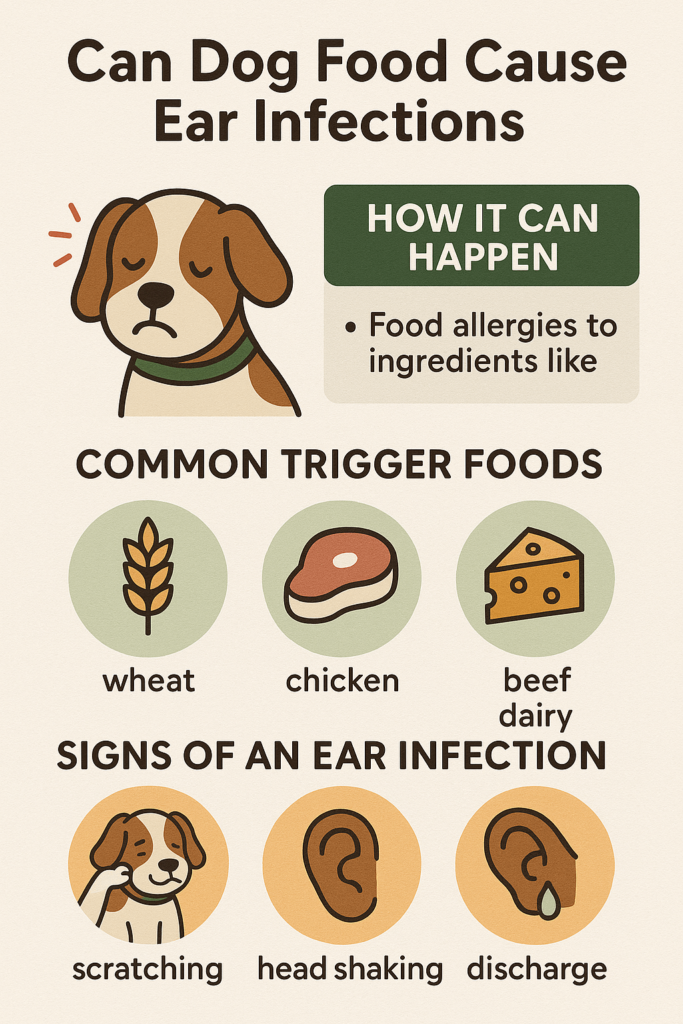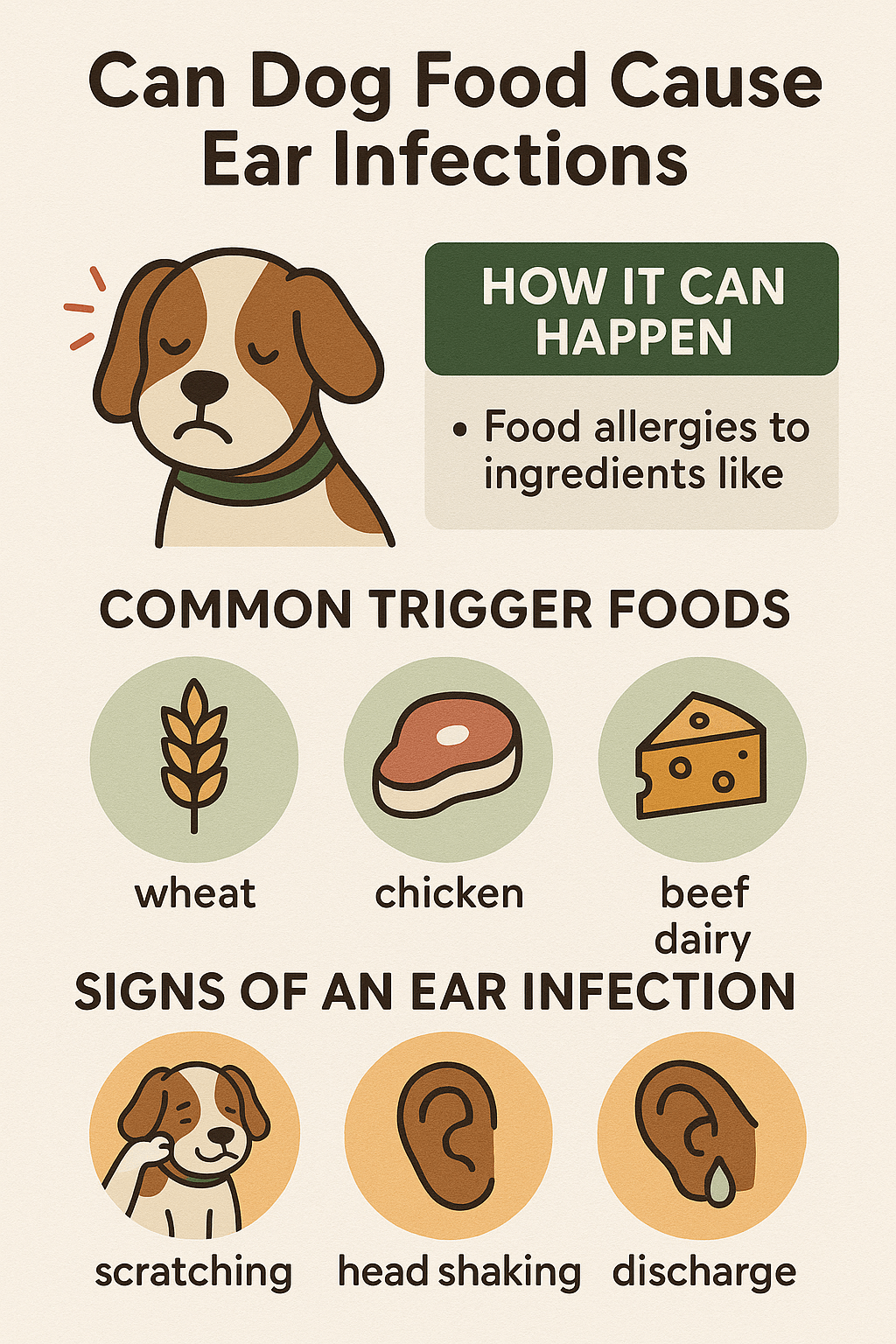Can Dog Food Cause Ear Infections?
Ear infections are a common concern for dog owners, and while there are many potential causes, diet often comes into question. Could the food you’re feeding your dog be contributing to these uncomfortable and sometimes painful conditions? While dog food itself isn’t directly responsible for ear infections, certain ingredients or dietary imbalances can play a role in triggering or exacerbating them. Understanding how your dog’s diet interacts with their overall health is key to preventing recurring ear issues. In this blog post, we’ll explore the connection between dog food and ear infections, identify potential culprits, and provide actionable tips to keep your pup’s ears healthy and infection-free.
Expert Insight on Ear Infections in Dogs
“Dogs, just like humans, can suffer from ear infections. Your dog might never have one, or they may get them routinely. If you find that your dog is getting frequent ear infections, you’re probably looking for the trigger.
If you’re wondering if food can contribute, the answer is yes, absolutely. In many aspects, food controls how the body functions, and when things are out of whack, many symptoms can appear. Let’s explain how it works and what you can do to protect your dog from ear infections.”
How Diet Can Influence Ear Health in Dogs
While ear infections are often caused by external factors like bacteria, yeast, or allergies, diet can indirectly contribute to these issues. Certain foods may weaken your dog’s immune system or trigger allergic reactions, making them more susceptible to ear problems. Here’s how diet can impact ear health:
Food Allergies:
Some dogs are allergic to specific proteins or grains in their food, which can lead to inflammation and increased risk of ear infections.Yeast Overgrowth:
High-carbohydrate diets can promote yeast production in the body, including the ears, creating an environment ripe for infection.Nutrient Deficiencies:
A lack of essential vitamins and minerals, such as omega-3 fatty acids, can compromise skin and ear health, making infections more likely.Excessive Sugar Intake:
Sugary treats or low-quality kibble can feed harmful bacteria and yeast, worsening existing ear issues.Poor-Quality Ingredients:
Fillers, artificial additives, and low-grade proteins in some dog foods can irritate sensitive systems and contribute to chronic ear problems.
By addressing these dietary factors, you can help reduce the likelihood of ear infections and support your dog’s overall well-being.

Signs Your Dog’s Diet May Be Linked to Ear Infections
If your dog frequently suffers from ear infections, their diet could be a contributing factor. Look out for these signs that suggest a dietary link to their ear problems.
Recurring Infections:
If your dog experiences ear infections multiple times a year, it may indicate an underlying issue, such as a food allergy or sensitivity.Itchy Ears or Excessive Scratching:
Persistent itching around the ears can signal an allergic reaction to something in their food.Strong Odor from the Ears:
A yeasty or foul smell often points to yeast overgrowth, which can be influenced by diet.Redness or Swelling:
Chronic inflammation in the ears may stem from food-related irritation or nutrient deficiencies.Digestive Issues Alongside Ear Problems:
Symptoms like diarrhea, vomiting, or excessive gas alongside ear infections can suggest a food intolerance.
Recognizing these signs early allows you to make dietary adjustments that may alleviate your dog’s discomfort.
Check this guide 👉Apple Cider Vinegar for Dog Ear Infections: Best 7 Tips!
Check this guide 👉Dog Ear Infection and Tea Tree Oil: Best 7 Expert Tips!
Check this guide 👉Dog Ear Injury from Fight: Best 7 Health Tips!
Foods That May Trigger Ear Infections | Foods That Promote Ear Health |
|---|---|
Foods with high sugar content | Diets rich in omega-3 fatty acids |
Low-quality proteins and fillers | Hypoallergenic or limited-ingredient diets |
Grains like wheat, corn, or soy | Fresh fruits and vegetables (in moderation) |
Artificial additives and preservatives | Lean meats like chicken, turkey, or fish |
Processed or sugary treats | Probiotic-rich foods for gut health |
Steps to Identify Food-Related Ear Infections
Determining whether your dog’s ear infections are linked to their diet requires careful observation and systematic testing. Follow these steps to pinpoint potential triggers.
Switch to a Limited-Ingredient Diet:
Feed your dog a diet with a single protein source and minimal ingredients to identify potential allergens.Monitor Symptoms Closely:
Keep a journal to track changes in your dog’s ear health after altering their diet. Note any improvements or flare-ups.Consult Your Veterinarian:
Work with your vet to rule out other causes of ear infections and discuss appropriate dietary changes.Perform an Elimination Diet:
Gradually reintroduce foods one at a time to identify which ingredients may be causing issues.Check for Food Sensitivities:
Common allergens include beef, dairy, wheat, and chicken—test these ingredients carefully if suspected.
By systematically testing and adjusting your dog’s diet, you can determine whether food is contributing to their ear problems.
Tips for Preventing Ear Infections Through Diet
Prevention is always better than cure when it comes to ear infections. By optimizing your dog’s diet, you can reduce their risk of developing these painful conditions.
Choose High-Quality Dog Food:
Opt for premium brands that prioritize natural, whole-food ingredients and avoid artificial additives.Incorporate Omega-3 Fatty Acids:
Add fish oil or flaxseed oil to your dog’s meals to support skin and ear health.Limit Carbohydrates:
Reduce carb-heavy foods that can promote yeast growth and worsen ear infections.Offer Fresh, Whole Foods:
Supplement your dog’s diet with fresh vegetables, fruits, and lean proteins for balanced nutrition.Avoid Sugary Treats:
Replace sugary snacks with healthier alternatives like freeze-dried meat treats or carrots.
A thoughtful approach to your dog’s diet can go a long way in preventing ear infections and promoting overall health.
Common Mistakes to Avoid When Addressing Ear Infections
When dealing with ear infections, it’s easy to make mistakes that can delay recovery or worsen the condition. Avoid these pitfalls to ensure your dog gets the care they need.
Ignoring Early Symptoms:
Delaying treatment can allow infections to worsen, leading to more severe complications.Using Human Medications:
Applying over-the-counter human treatments can irritate your dog’s ears further and cause harm.Not Cleaning Ears Properly:
Improper cleaning techniques can push debris deeper into the ear canal, worsening the infection.Overlooking Dietary Factors:
Focusing solely on topical treatments without addressing potential dietary causes can lead to recurring issues.Skipping Veterinary Check-Ups:
Self-diagnosing and treating without professional guidance can result in mismanagement of the condition.
By avoiding these mistakes, you can help your dog recover faster and prevent future infections.
Alternative Remedies to Support Ear Health
In addition to dietary changes, there are alternative remedies that can complement traditional treatments and promote ear health.
Coconut Oil Drops:
Coconut oil has natural antifungal and antibacterial properties that can soothe irritated ears.Apple Cider Vinegar Rinse:
Diluted apple cider vinegar can help restore pH balance and discourage yeast growth.Herbal Supplements:
Herbs like calendula and chamomile have anti-inflammatory properties that may benefit ear health.Probiotic Supplements:
Boosting gut health with probiotics can strengthen the immune system and reduce infection risks.Regular Ear Cleaning:
Use a vet-recommended ear cleaner to gently remove dirt and excess wax, preventing buildup.
These remedies can enhance your dog’s ear care routine and support long-term health.
Understanding the Role of Allergies in Ear Infections
Allergies are a major contributor to ear infections in dogs, and understanding their role can help you address the root cause of the problem.
Environmental Allergies:
Pollen, dust mites, and mold can irritate your dog’s skin and ears, leading to infections.Food Allergies:
Proteins like beef, chicken, or dairy are common culprits behind food-related ear issues.Seasonal Flare-Ups:
Some dogs experience ear infections during specific seasons due to environmental allergens.Chronic Inflammation:
Allergies can cause ongoing inflammation, making the ears more vulnerable to infections.Cross-Reactivity:
Dogs allergic to one substance may react to others, complicating diagnosis and treatment.
By identifying and managing allergies, you can significantly reduce your dog’s risk of ear infections.
Frequently Asked Questions About Dog Food and Ear Infections
Can grain-free dog food prevent ear infections?
Grain-free diets may help dogs with grain sensitivities, but they aren’t a guaranteed solution for all ear issues.
Are certain dog breeds more prone to diet-related ear infections?
Breeds with floppy ears, like Cocker Spaniels or Basset Hounds, are more susceptible due to limited airflow, which can be exacerbated by diet.
How long does it take to see improvements after changing my dog’s diet?
It can take several weeks to notice improvements as your dog’s system adjusts to the new diet.
Should I stop feeding treats if my dog has ear infections?
Not necessarily, but choose hypoallergenic treats and avoid sugary or processed options.
Can probiotics help with ear infections?
Yes, probiotics support gut health, which can strengthen the immune system and reduce the risk of infections.
Taking Control of Your Dog’s Ear Health Through Nutrition
While dog food alone isn’t the sole cause of ear infections, it plays a significant role in your dog’s overall health and susceptibility to these issues. By identifying potential dietary triggers, choosing high-quality ingredients, and working closely with your veterinarian, you can take proactive steps to prevent and manage ear infections. Remember, every dog is unique, so finding the right balance may require patience and experimentation. With the right approach, you can ensure your furry friend enjoys a happy, healthy life free from the discomfort of chronic ear problems.
Do Cats Have Taste Buds? Best 7 Expert Tips! – Discover how cats experience flavors and why their taste is so unique.
Do Dogs Have Taste Buds? Best 7 Expert Tips! – Discover how dogs experience taste, their preferences, and what it means for their diet and health.
Can Cats Taste Sweet? Best 7 Expert Tips! – Discover why cats can’t taste sweetness, how it affects their diet, and tips to keep them healthy and happy.
Can Dogs Taste Sweet? Best 7 Expert Tips! – Discover how dogs perceive sweetness, which foods are safe, and tips to manage their sweet cravings responsibly.





